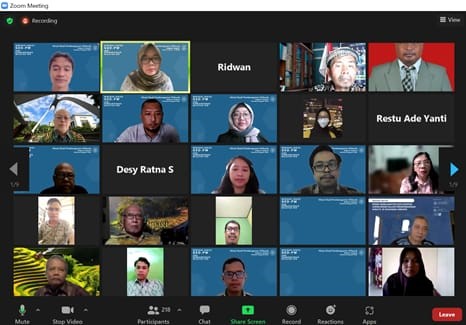
Interest in Regional Development Studies, Master of Geography, Faculty of Geography UGM is holding the GEO-PW Webinar Series which is the first webinar of the IKN Regional Development Series Webinar on Saturday, March 19 2022 with the theme “The Future of IKN: Contribution to the Field of Geography-Regional Development”. This webinar displays the expertise of lecturers in the Interest in Regional Development Studies consisting of Dr. Rini Rachmawati S.Si., M.T. with the topic “City Development and Smart City IKN”, Dr. Andri Kurniawan, S.Si., M.Sc. with the topic: “IKN Strategic Area Development Plan”, Dr. Lutfi Muta’ali, S.Si., M.T. with the topic: “IKN in the Context of Regional Economic Development”, Dr. Estuning Tyas Wulan Mei, S.Sc., M.Sc., M.Sc. with the topic: “Disaster Perspective in IKN”, as well as Prof. Dr. M. Baiquni, M.A with the topic: “IKN Tourism Prospects”. The webinar was attended by 300 participants from various agencies such as ministries, institutions and local governments, as well as lecturers, students and the general public.
The webinar was opened with an introduction to Interest in Regional Development Studies delivered by Dr. Rini Rachmawati, S.Si., M.T. as Head of Interest in Regional Development Studies, Master of Geography. Dr. Rini conveyed that the purpose of holding the Geo-PW Series Webinar is as a forum for the development of knowledge and insights related to Geography-Regional Development so that it can provide alternative plans for the future development of IKN. The opening ceremony was followed by remarks from the Dean of the Faculty of Geography UGM, Dr. Danang Sri Hadmoko, S.Si., M.Sc. who said that the National Capital City needs to be seen from various perspectives of expertise and approaches both the Sustainable Development Goals (SDGs) 2030 Agenda and several key indicators of climate change.
The first speaker, Dr. Rini Rachmawati S.Si., M.T., said that the development of IKN needs to be carried out with a smart and integrated concept where the development carried out can overcome city problems so that it can become a livable capital city. IKN provides its own opportunities as an attraction for East Kalimantan Province. Through the concept of Green City, Forest City, Livable City, and Smart City Sustainable City orientated as IKN Model Cities for the World. Various readiness of the region as a capital city both in terms of physical infrastructure, ICT, and human resources have been planned and outlined in a joint program in the Smart City Masterplan for the IKN area covering six dimensions of Smart City namely Smart Governance, Smart Branding, Smart Economy, Smart Living, Smart Society and Smart Environment.
Next, Dr. Andri Kurniawan, S.Sc., M.Sc., explained the framework for the strategic development of the “Archipelago” National Capital (IKN). The existence of IKN has an influence, especially for eastern Indonesia, therefore various efforts are needed to move it through six corridors, from production centers to corridors as centers for the development of national food, fisheries, energy and mining. Investment, infrastructure support and accelerated economic growth, as well as regulations are among the aspects that need attention. The hope is that IKN can accelerate regional cooperation between regions and be able to strengthen your region so that IKN will become a new growth center that is integrated with the National Activity Center.
IKN in the Context of Regional Economic Development was delivered by Dr. Lutfi Muta’ali, S.Si., M.T. In the context of development, it is necessary to have a constellation of economic corridors in Kalimantan, namely
IKN with intraregional and interregional characters of Kalimantan. Furthermore, the association of IKN has a linear relationship with expediency. Building linkages is the key in the development of IKN. There are seven linkages in the development of IKN, namely Physical, Economic, Technological, Population Movement, Social, Service Delivery, and Political. The concept of IKN Forest City in the City of Kalimantan City system needs to be backed up with hinterland in each corridor such as Samarinda, Balikpapan, and the surrounding area so as to create space for economic interaction in building linkage spaces.
The fourth speaker, Dr. Estuning Tyas Wulan Mei, S.Sc., M.Sc., M.Sc. delivered presentation materials related to risk-oriented and disaster-resilient development, sustainable development and disaster risk reduction, as well as disaster-resilient capital planning. Efforts to reduce disaster risk and create a resilient capital can be carried out in various ways, such as: prevention, mitigation (structural and non-structural), risk transfer and preparedness. Therefore, it is necessary to take an inventory of resources in reducing disaster risk) to unlock economic potential, and develop co-benefits.
The last speaker, namely Prof. Dr. M. Baiquni, M.A. convey the prospects of tourism in IKN & East Kalimantan. Beginning with an explanation of the importance of IKN which cannot be separated from village development, the contribution of geography in regional development, especially in tourism, and the importance of human resources is the opening statement from Prof. Dr. M. Baiquni, M.A. In the tourism aspect, moving the capital will encourage regional development and tourism destinations. Therefore, there is a need for innovation, coordination and collaboration through geographic planning in both macro and micro regional approaches.
In closing the GEO-PW#1 Webinar Series event, a discussion and question and answer session was held. There were 22 questions from webinar participants which were then answered in general by the speakers. In closing the event, Dr. Rini Rachmawati, S.Si., M.T. said that after the GEO-PW Webinar Series the IKN Regional Development series was expected to be continued with the holding of the next webinar and the preparation of a book about IKN
